Ashwagandha, a popular adaptogenic herb in traditional Ayurvedic medicine, is often praised for its stress-reducing properties. However, some individuals report experiencing increased anxiety while taking this supplement. Understanding the relationship between ashwagandha and anxiety is crucial for anyone considering this herbal remedy.
While ashwagandha is generally recognized for its calming effects, its impact can vary significantly from person to person. This comprehensive guide explores the potential connections between ashwagandha and anxiety, helping you make an informed decision about its use.
The Complex Relationship Between Ashwagandha and Anxiety
Ashwagandha typically works as an adaptogen, helping the body manage stress and reduce anxiety levels. However, some individuals may experience paradoxical reactions, where the herb actually increases feelings of restlessness or anxiety. This variation in response can be attributed to individual body chemistry, dosage, and existing health conditions.
How Ashwagandha Affects the Nervous System
The herb interacts with several neurotransmitter systems in the brain, including GABA receptors, which play a crucial role in reducing anxiety. However, this interaction can sometimes lead to unexpected effects, particularly in people who are sensitive to herbal supplements or have underlying anxiety disorders.
Dosage Considerations and Anxiety Risk
The likelihood of experiencing anxiety-related side effects from ashwagandha often correlates with dosage. Starting with a lower dose and gradually increasing it can help minimize the risk of adverse reactions. Most studies suggest starting with 300-500 mg daily, though individual needs may vary.
Signs of Ashwagandha-Related Anxiety
Common indicators that ashwagandha might be contributing to anxiety include:
- Increased restlessness or agitation
- Racing thoughts
- Difficulty sleeping
- Heart palpitations
- Heightened nervous energy
- Digestive disturbances
The Thyroid Connection
Ashwagandha can influence thyroid function by potentially increasing thyroid hormone levels. This effect may indirectly impact anxiety levels, as thyroid imbalances can manifest as anxiety-like symptoms. People with thyroid conditions should be particularly cautious and consult healthcare providers before using ashwagandha.
Safety Considerations and Precautions
Before starting ashwagandha supplementation, certain factors should be carefully considered to minimize the risk of anxiety-related side effects:
- Individual sensitivity to herbs and supplements
- Existing medical conditions, especially anxiety disorders
- Current medications and potential interactions
- Quality and source of the supplement
- Personal stress levels and lifestyle factors
Frequently Asked Questions
Can ashwagandha cause anxiety or worsen existing anxiety symptoms?
Yes, while ashwagandha typically reduces anxiety, some individuals may experience increased anxiety or worsening of existing symptoms, particularly if they're sensitive to the herb or taking incorrect dosages.What is the recommended safe dosage of ashwagandha to avoid anxiety or restlessness?
The generally recommended starting dose is 300-500 mg daily, taken with meals. It's advisable to start with the lowest effective dose and gradually increase if needed while monitoring for side effects.How does ashwagandha interact with thyroid function and can this affect anxiety levels?
Ashwagandha can increase thyroid hormone production, which may indirectly affect anxiety levels. People with thyroid conditions should consult their healthcare provider before using ashwagandha.What are the possible side effects of ashwagandha related to anxiety and nervous system symptoms?
Possible side effects include increased restlessness, agitation, sleep disturbances, racing thoughts, and in some cases, heightened anxiety or nervous system activation.Should people with anxiety disorders or thyroid conditions consult a doctor before taking ashwagandha?
Yes, it's essential for individuals with pre-existing anxiety disorders or thyroid conditions to consult with a healthcare provider before starting ashwagandha supplementation to ensure safe and appropriate use.
Understanding your individual response to ashwagandha and working closely with healthcare providers can help maximize its benefits while minimizing the risk of anxiety-related side effects.




